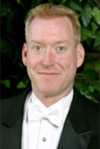CBDNA on Twitter and email
I am sorry to have missed the CBDNA Conference for the first time in several years. Twitter is a closed book to me; I can just about cope with Facebook to receive birthday greetings and pictures of former students with their babies, but tweeting is not my scene... that is until I came across the tweets about the CBDNA National Convention in Washington.
Tweet tweet - fantastic concert - spectacular performance and extraordinary piece - incredible conference...
The Conference was obviously everything to be expected - but behind the hyperbole, what was really worth listening to at Washington, or indeed at previous conferences. I tried to discover, surfing the web without success, and also inviting a number of colleagues to contribute. Everyone seem to be too busy to help, so one can only imagine that they did not enjoy anything enough to recommend the rest of us to listen and programme. However, there were three contributions, Rob Carnochan from University of Texas at Austin on Twitter, and Cynthia Johnson-Turner from Cornell University on email - many thanks!
First Rob Carnochan who tweeted:

Something I ponder after #cbdna11 - What pieces from the past 10 years will I program - what are THE BEST pieces that deserve a long life?
Highlights in no particular order:
- 9: Puckett Shadow of Sirius/Miami/Tudy Kane flute
- 8: Goossens/Texas State/Beatt
- 7: Schwantner Sparrows/Hartt/Cherie Cluda soprano
- 6: Ticheli Symphony #1/Miami/Green
- 5: Pann Rene (from Rene and Richard)/Ball State/Caneva
- 4: Bolcom Orphee Serenade/Hartt/Adsit
- 3: Conducting clinic/Schwartz
- 2: Stravinsky/Seattle symphony players/Waybright
- 1: Dvorak Serenade/UMKC/Davis
Rob Carnochan
Associate Professor of Instrumental Conducting,
Associate Director of Bands, Director of the Longhorn Band
512-471-4093
carnochan@mail.utexas.edu
Sarah and Ernest Butler School of Music
Cynthia Johnston Turner Tweet:

In my view, ensembles Foot in the Door and Performance 20/20 from the Hartt School with Glen Adsit and Matthew Aubin, was a highlight of the conference. Far from a traditional band or chamber winds concert (various pieces incorporated solo strings and a soprano voice), the performance reiterated the idea for me that "standard" may be a thing of the past with forward-thinking musicians and audiences. The first piece on the program,Burning Music by Jess Turner (who also played trumpet in the ensemble) was a tour-de-force both technically and emotionally. He painted pictures of various properties of fire with witty quotations of Stravinsky's Firebird and de Falla's Ritual Dance. One could imagine programming a concert dealing with the four elements of nature...
I'm a fan of Stephen Gryc, so was delighted to hear Fantasy Variations for string quartet and saxophone. I could have listened to that sax player all day...what a sound. And Sparrows by Schwantner, featuring soprano Cherie Caluda is one of my favorite Schwantner pieces and was performed beautifully. (Perhaps the singer was a little over-balanced at first...)
By far, my favorite piece on the concert was Bill Bolcom's Orphee Serenade. Gorgeous, witty, hilarious, sweet, lush... who could ask for more, and I loved how Glen sat down during the slow movements that didn't need a conductor. We conductors need to know how often we are unnecessary or even an inhibitor. Equinox by Joe Turrin closed the program and I was proud to be part of the consortium that commissioned it. There is optional poetry with the music which I really wanted to be more a part of the performance. Perhaps one could consider having the poetry on a large screen as the music is playing...or even read aloud during the music?
Cynthia Johnston Turner, Associate Professor
Director of Wind Ensembles
Cornell University
www.cuwinds.com
607-255-3712
The tweets are down. I hope that it might be possible to hear the music when it is uploaded on BandDirector (see CBDNA Programmes) but Miller Asbill's question still remains:
Does the conference conversation end now or really begin. What about the future?
And so does Rob Carnochan's £10,000 question:
What pieces from the past 10 years will I program - what are THE BEST pieces that deserve a long life?